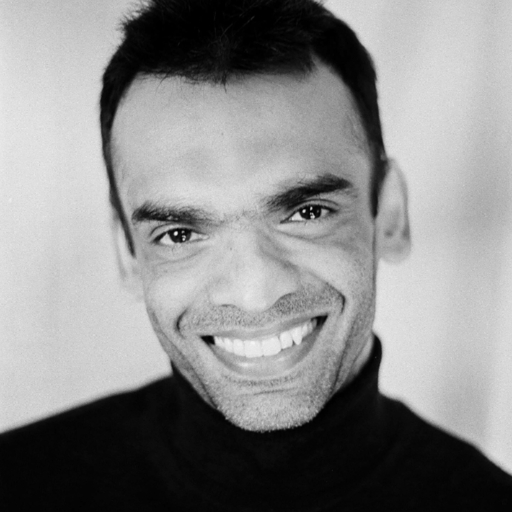Circular economy, circular opportunity: Turning waste into wealth in Senegal
Why It Matters
With rising sea levels and increasing pressure on natural resources, Senegal's future hinges on sustainable solutions. A circular economy offers a pathway to a more resilient and equitable future for the country.
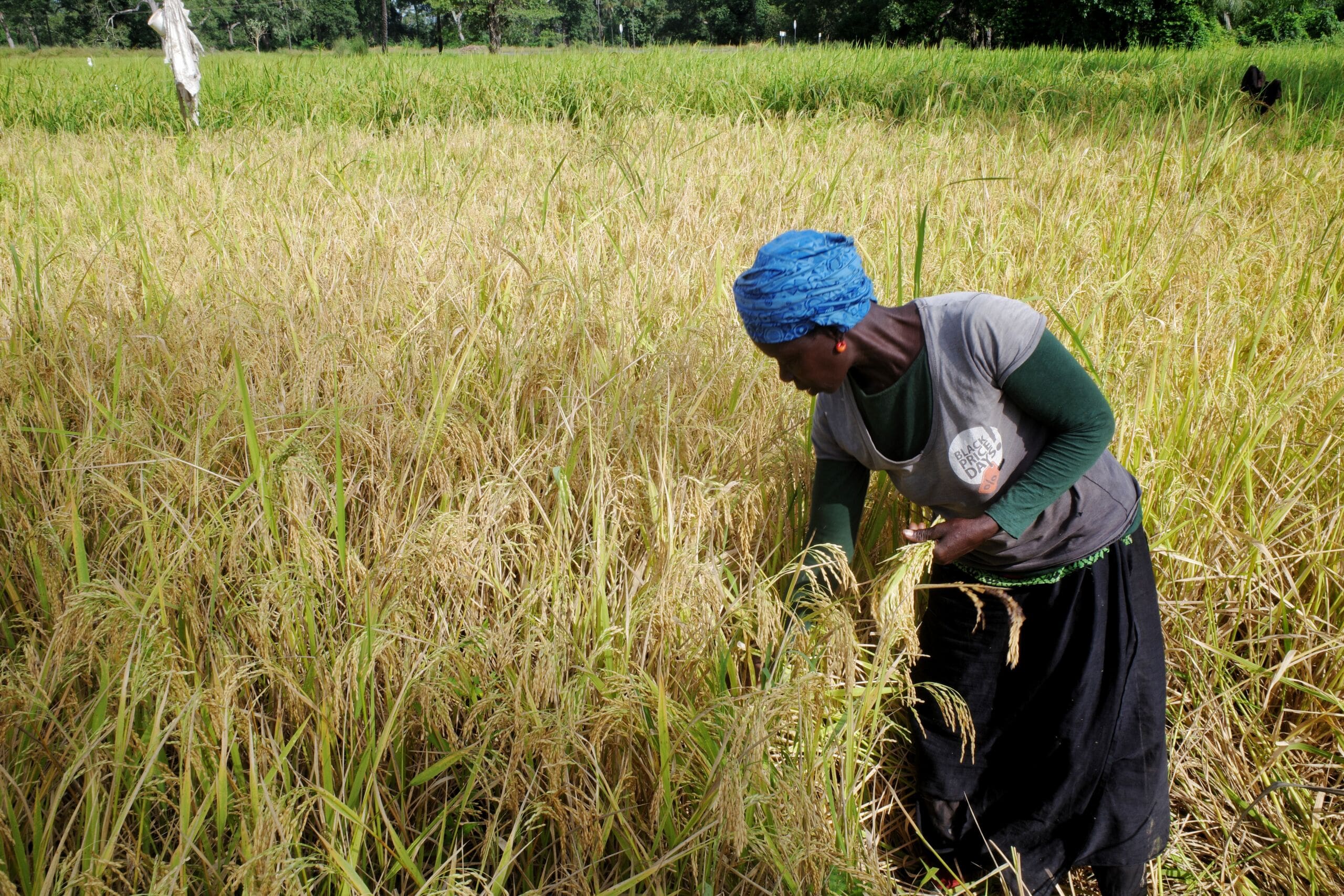
Nothing is lost; everything is transformed.
Sitting by the shore of the Casamance River, overlooking a mangrove forest on a sunny October evening, that’s how Moussa Dia summarized the circular economy.
Dia is a supply chain expert in Senegal, working for the Mennonite Economic Development Associates (MEDA), an international development organization headquartered in Canada.
He works on various circular economy projects supported by MEDA in Senegal’s southern Sédhiou region.
“Our targets are primarily women and young men involved in value chains,” Dia said. “We work directly with all players from production to consumption.”
The circular economy focuses on recycling, reusing, repurposing and remanufacturing waste materials. It’s the opposite of the dominant make, consume, then waste system.
For a lower-middle-income country like Senegal, which has agricultural resources but lacks manufacturing capacity, the circular model can create factory jobs and a stronger supply chain, especially in rural areas.
Seeds of change
One such project is T&M, which uses local fruits that are generally wasted after harvesting to make food products and high-end cosmetics.
The startup was founded by Augustina Ephraim and Moulaye Biaye, a young couple who met in France while in university. Ephraim, originally from Ghana, is a chemical engineer, and Biaye, a native of Sédhiou, has a background in statistics and banking.
T&M opened its factory in Sédhiou’s Goudomp department in 2023.
“We had a vision, a common goal: to return to Africa after our studies,” Ephraim said. “With our complementary skills, we joined forces to create this industrial project.”
The couple chose the countryside instead of urban centres.
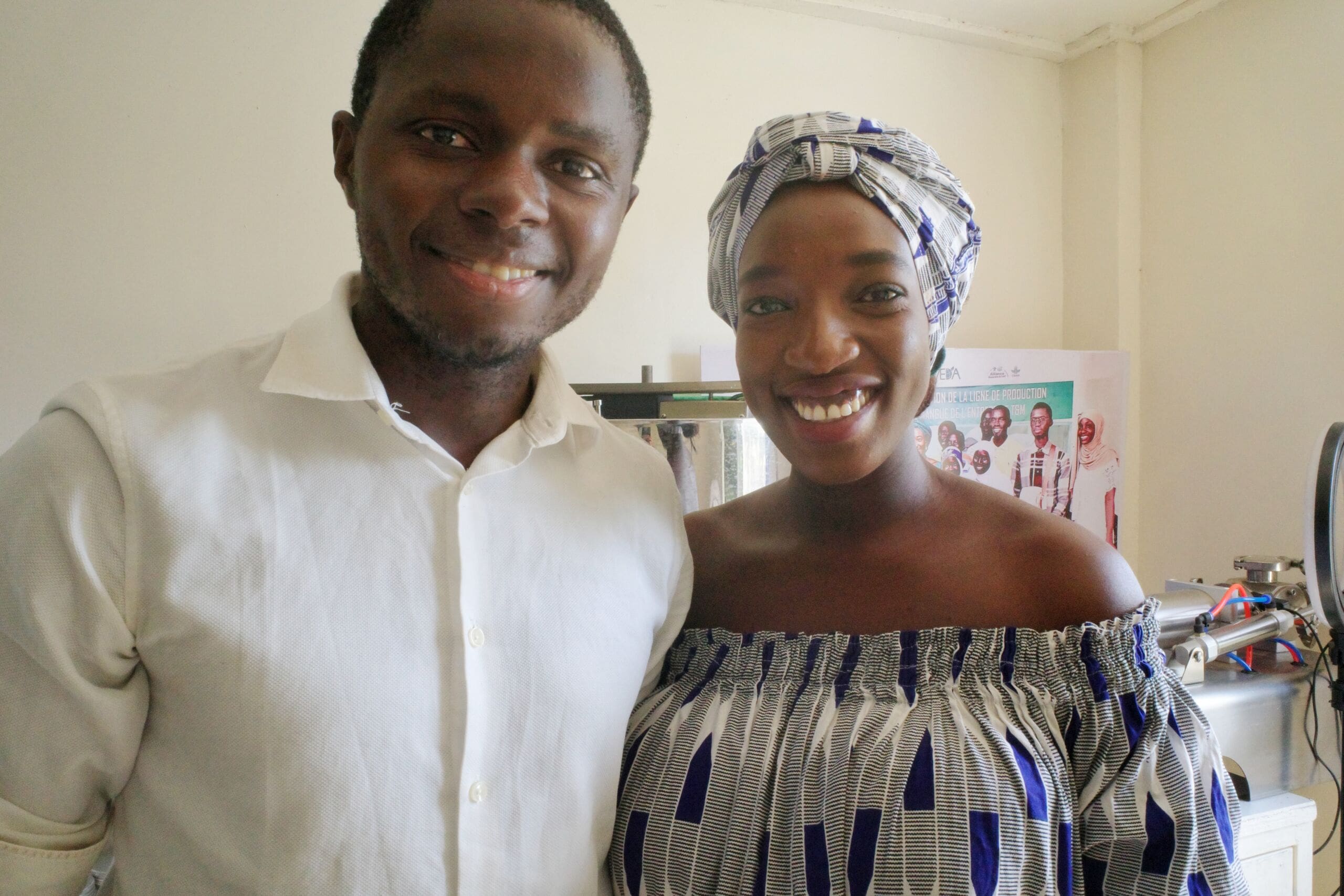
“There are many capable people in these areas, but they lack job opportunities. This leads to a rural exodus of young people. We aim to address this with the construction of this plant,” Ephraim said.
Biaye has a deep attachment to the region. He grew up during the Casamance conflict, an armed confrontation between the independence-seeking Movement of Democratic Forces of Casamance and the state of Senegal. Four decades after tensions began, a peace agreement between the conflicting parties was signed in 2022.
“As a child, I wanted to leave, so I managed to go to France for my studies,” Biaye said.
But “this region gave me everything, and after the conflict, it needs rebuilding. Who better to rebuild and contribute to its economic development than those who grew up here?”
Ephraim and Biaye began by identifying products whose value may have been overlooked.
“The cashew apple in this area wasn’t being used; it was a waste product. We knew there was potential for cashew juice,” Ephraim said.
“We discovered that in Brazil, cashew juice is the national juice, proven to be rich in vitamin C and magnesium, bringing a lot of value to Brazilians. So, we thought, ‘Why not do the same here? Why not maximize our cashew resources?’ Given the potential, we decided to start making cashew juice,” she explained.
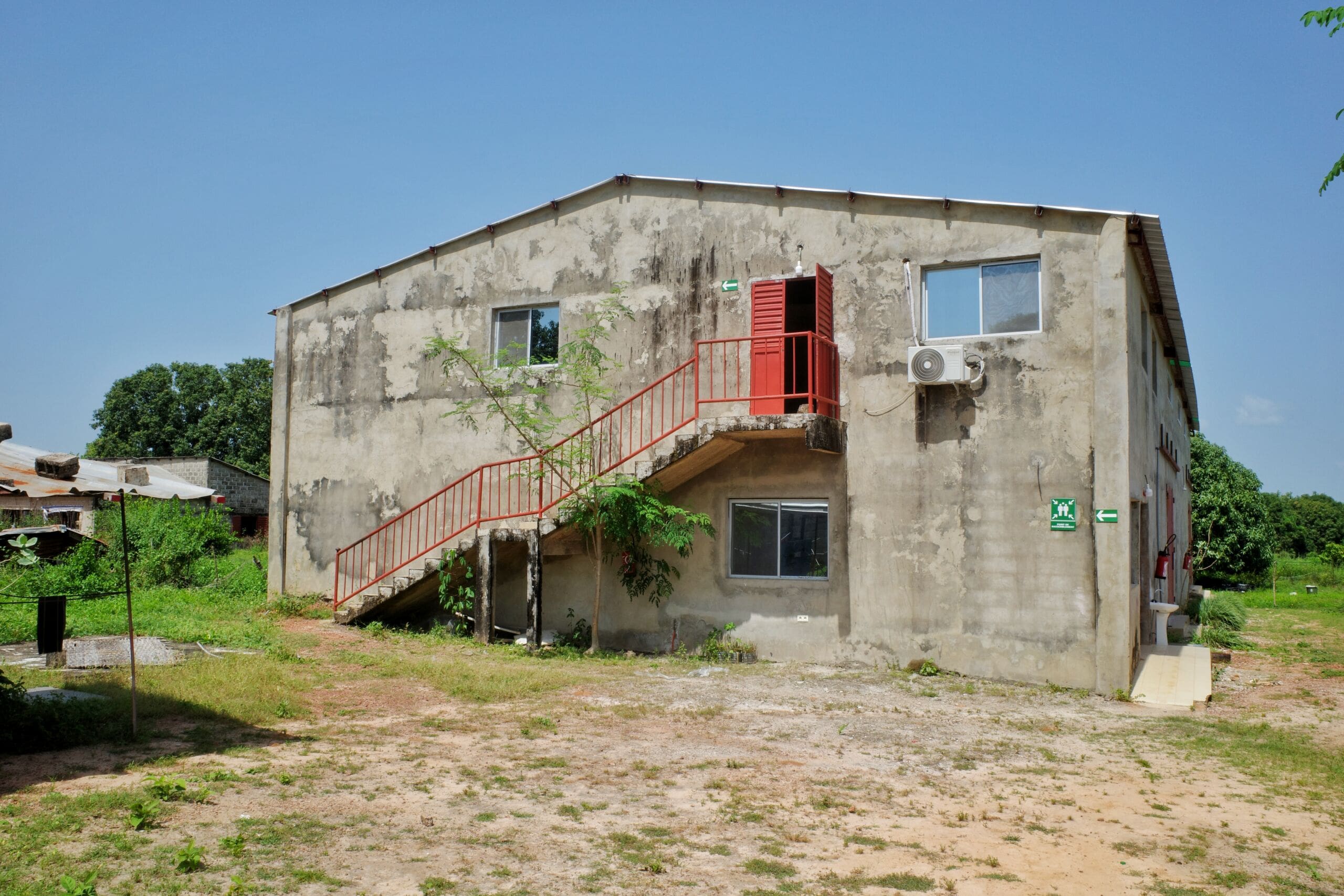
Due to the produce’s seasonal nature, the couple wanted to diversify their product line and identified another local fruit: mango. According to Ephraim, the startup entered the mango industry to make it more resilient.
“We saw many mangoes growing around us and noticed that over 80 per cent weren’t being processed,” she said.
“Some are harvested for export, but many varieties aren’t in high international demand. They’re sold locally but with significant losses due to whiteflies, which reduce profitability.”
In addition to juice, Ephraim discovered mango seeds’ cosmetic potential. “I researched how to use these nuts. They contain high-quality fats that can be extracted as mango butter, which is highly valued in cosmetics,” she said.
“Since we already have a company in the agri-food, producing mango butter was a logical step,” Ephraim said.
The idea of making cosmetic products came to her when she was still in France.
“When researching products, I saw shea butter and other oils and discovered mango butter. I was astonished because I didn’t know it existed,” she said.
“I looked into it and wanted to know where it came from. The vast majority came from India. I thought, ‘Okay, but does any come from Africa?’” Ephraim added.
“That’s when it hit me. I said, ‘Wait, we have a lot of mangoes, but we don’t have mango butter.”
T&M sells its cosmetic products in high-end salons in the capital, Dakar. The startup’s juice production capacity is 1,000 litres of mango and cashew juice per hour.
In just two years, the factory has become one of the few in the region producing cashew juice at a semi-industrial level and employs 17 people.
Its indirect impact includes local businesses, especially producers who sell raw materials to the factory.
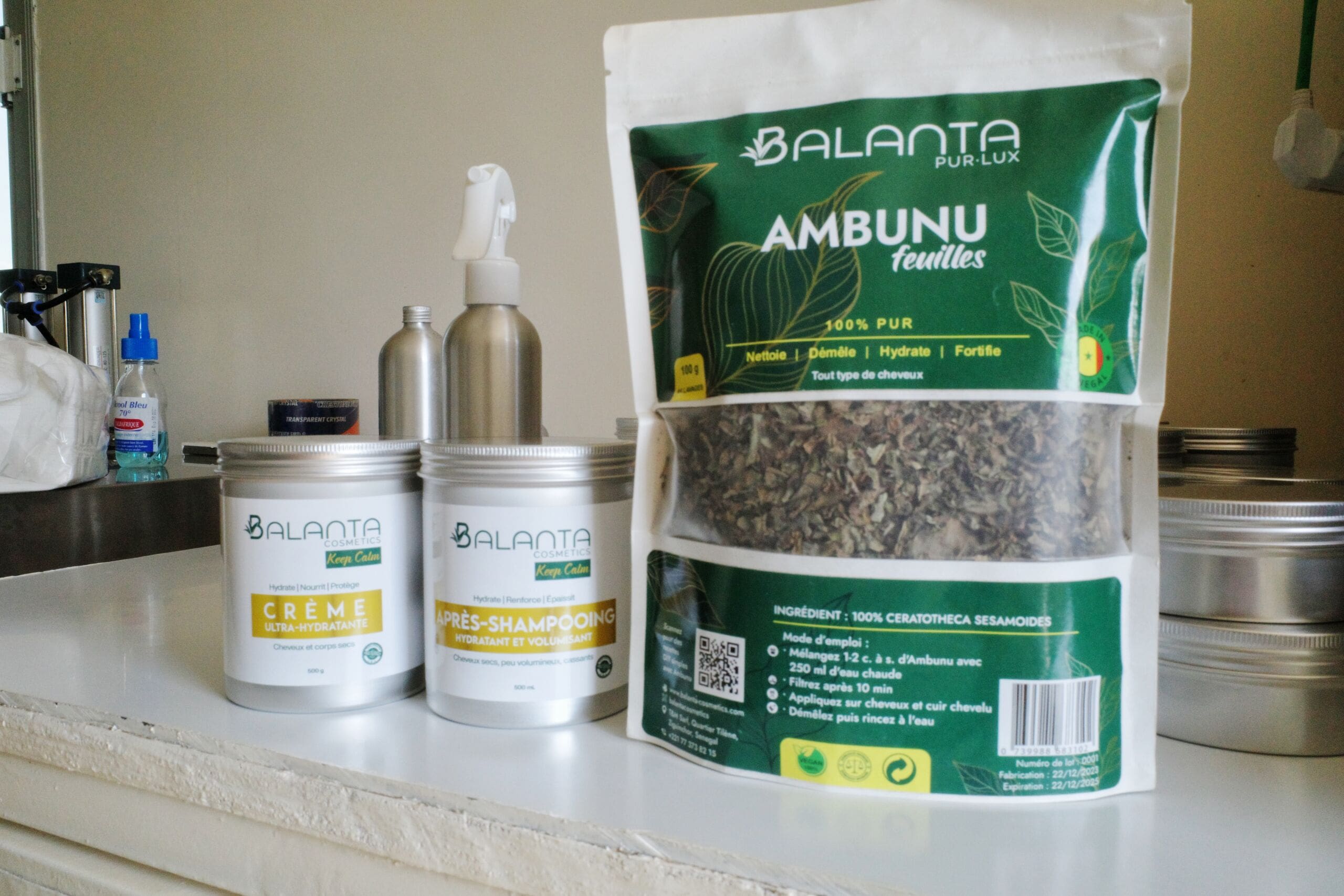
As part of the circular economy, the company doesn’t simply focus on utilizing waste from other sectors but also on recycling the waste produced during its own production.
“For example, after extracting the juice, the cashew apple residue can be used as cattle feed. Mango waste and stalks can be used for chicken [feed]. After extracting mango butter, the remaining material can be composted, and a solid cake can be used in cosmetics,” Ephraim explained.
Meanwhile, organic compost directly supports the industry the startup relies on for raw materials.
“Agricultural production, particularly rice, is reliant on chemical fertilizers. This poses a public health problem. Even though chemical fertilizers increase production, they impoverish soil quality,” Ephraim said.
“Organic fertilizers not only help to regenerate soil structure, they also help to restore the soil’s texture, reinforcing production,” said Dia, adding that improving soil quality is vital given the salinity caused by the rising sea level.
Feuling a cleaner environment
Univers Casa Bio is another initiative that focuses on agricultural waste. Founded in 2021 and based in Ziguinchor, the largest city in the southern Casamance region, the startup transforms waste into biochar—charcoal—and biofertilizers.
Casa Bio tackles one of the country’s most pressing environmental issues— deforestation—by producing organic charcoal.
Senegal’s forests are heavily exploited to make charcoal for cooking, and Casamance has the country’s last remaining forests.
The prevalent artisanal method of producing charcoal is also pollution-intensive. It involves burning wood in an open grindstone, which releases carbon dioxide in the air.
Casa Bio does not use wood to produce biochar and biofertilizers. Its director, Aliou Badji, explained that the startup recycles local biomass such as groundnut shells, palm shells, coconut husks, cashew shells, millet stalks, corn, and rice cobs.
“Instead of going into forests and cutting trees, we take the biomass around the trees,” he said.
The biomass is carbonized during production, and the smoke content is removed. Badji said this ensures their charcoal is safer for the environment and human health.
According to Badji, Casa Bio’s charcoal also lasts longer, making it cheaper in the long run. He said the startup’s customer base consists mainly of local households, suggesting its products’ superiority in terms of quality and affordability.
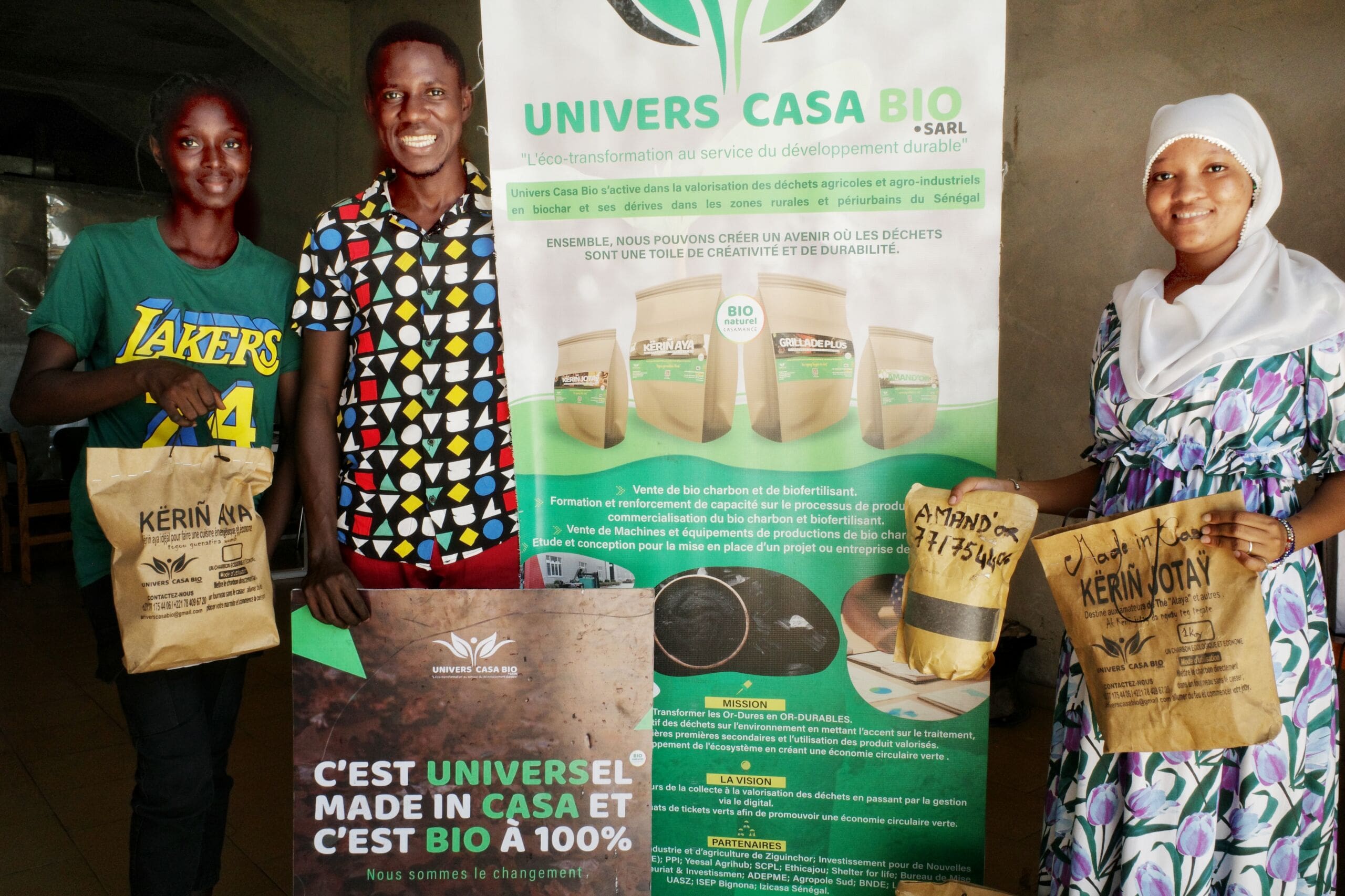
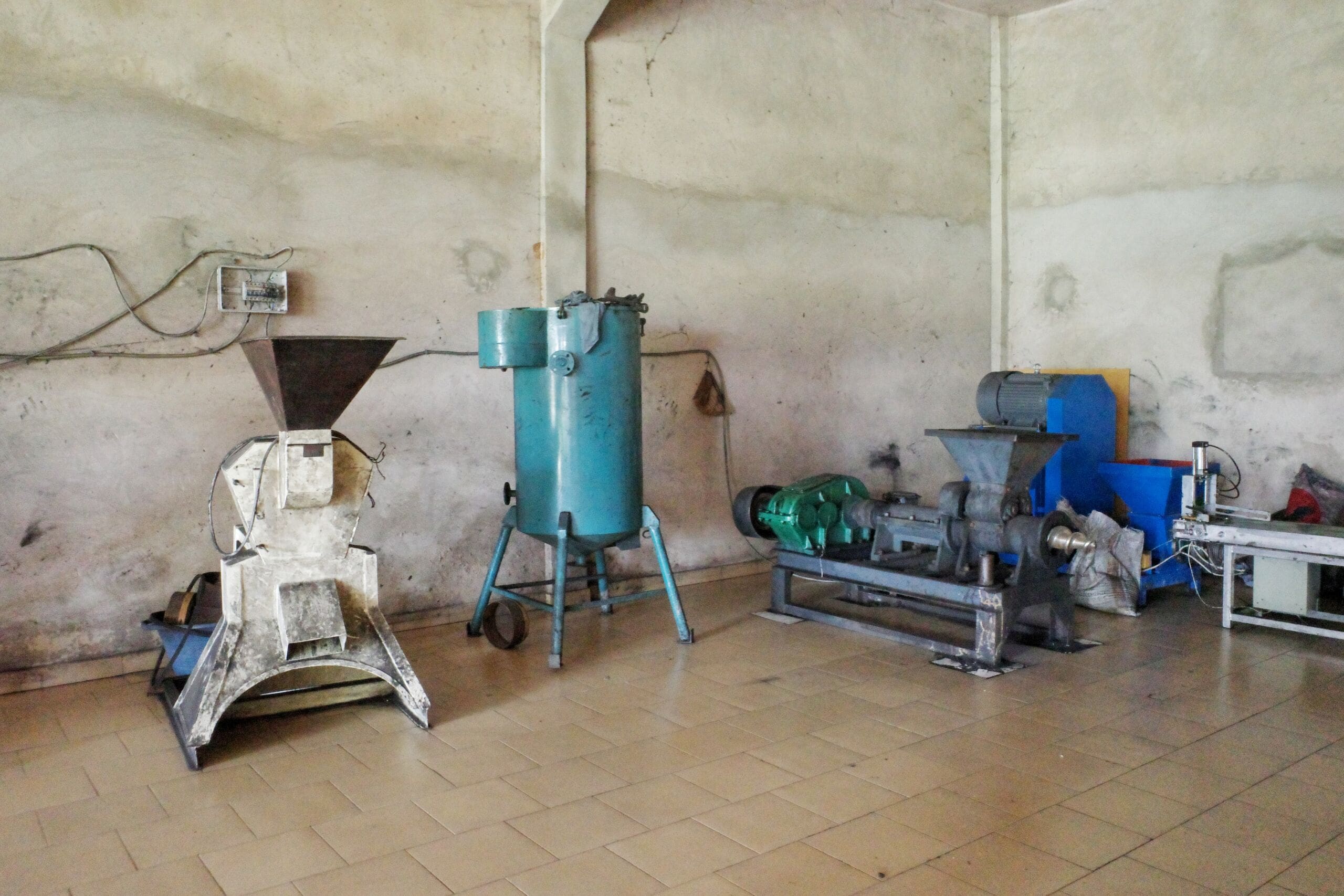
But the company’s customer base isn’t limited to domestic consumption. Its products are used in restaurants, and the sector’s demands are too big for Casa Bio to fill. The supermarket chain Auchan has also shown interest in buying the charcoal.
On an industrial level, Badji said that Dangote Cement, owned by Africa’s richest man, Aliko Dangote, has been in contact with the startup to buy 100 tons of charcoal.
Casa Bio’s production capacity is 200 kilos a day. It employs 11 workers, and its current sales is $25 million CFA or about $57,000.
Currently, Senegal imports most of its coal. Badji hopes that domestic production capacity and better-quality products can replace the need to buy internationally.
He also believes domestic biochar production can help Senegal establish national standards for biochar and integrate it into Senegal’s carbon market.
A cooperative’s uphill battle
Not all circular economy operations in Casamance are semi-industrial. Some are small co-operatives run by the villagers.
One such initiative, set up as an economic interest group to serve its members, is in Yacouba commune in the Bounkiling department.
The group has more than 100 members, nearly all women. With MEDA’s financing, the members rehabilitated a small building in the commune and bought equipment to turn it into a juice processing plant, which opened two years ago.
Like T&M, the group uses mangoes from surrounding orchards that would otherwise go to waste. The factory also uses other fruits and vegetables to produce more juices, syrups and marmalade. Depending on the supply, the women can process 10 to 20 kilos of raw materials daily.
However, unlike T&M and Casa Bio, the unit is small, does not produce specialized products, and is in the early stages of business and professional development.
The factory does not employ staff; the cooperative members work as volunteers. Their daily earnings depend on how much they sell.
“Every day, the women load up the coolers. They go to schools and neighbourhoods to sell. When they return, we calculate the money, take out our percentage and give them theirs,” said one of the women who manages the factory.
A woman sells up to 2,000 CFA ($4.50) daily, most of which goes to the factory. Some days, there are no sales. The volunteers sometimes start their work as early as 7 a.m. and end in the evening.
Women who aren’t group members and don’t volunteer at the factory can also access the products. However, they must buy them from the factory and then sell them in the market to make money.
Despite the difficult working circumstances, the members commit to the factory because there are no other employment opportunities for women in the village.
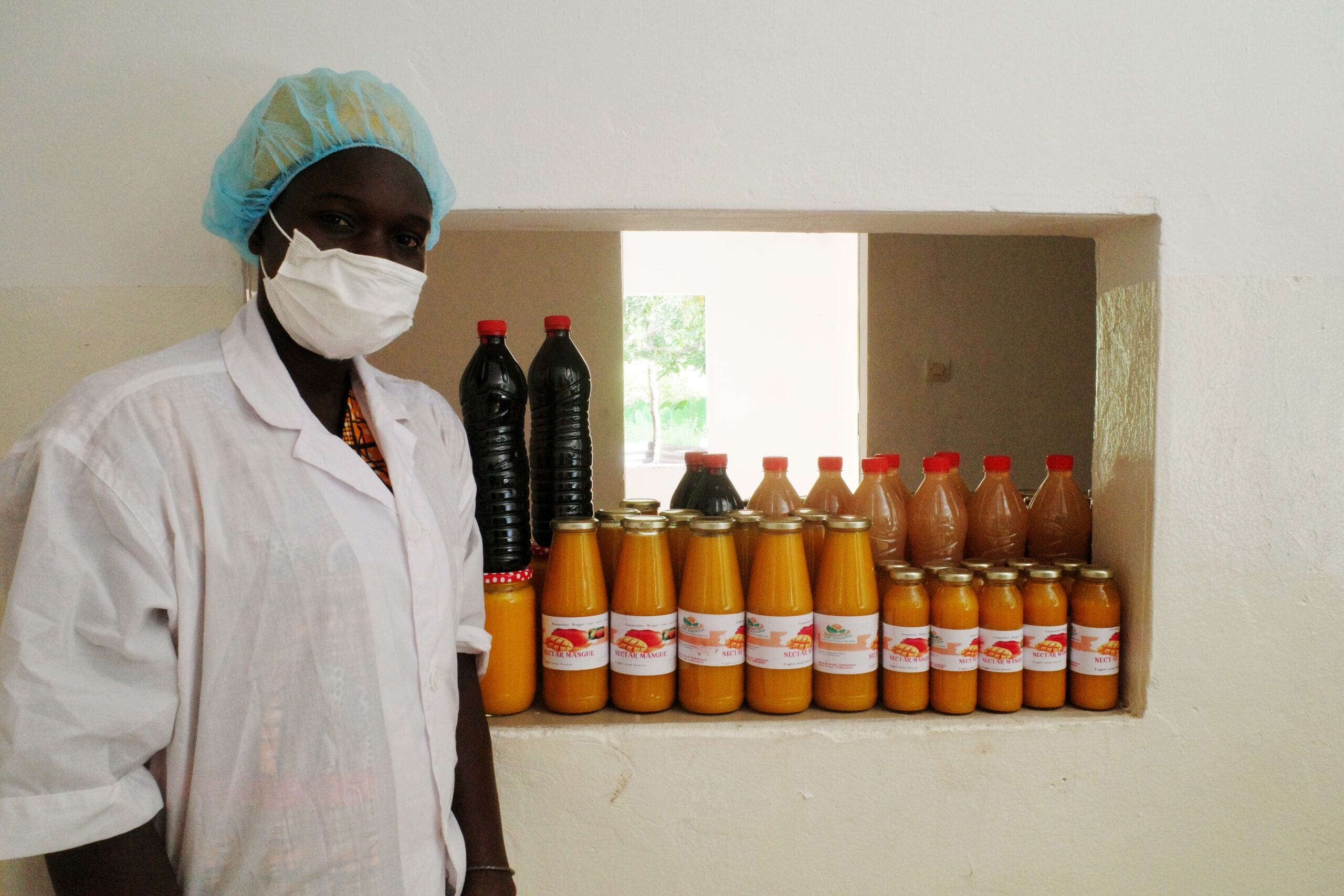
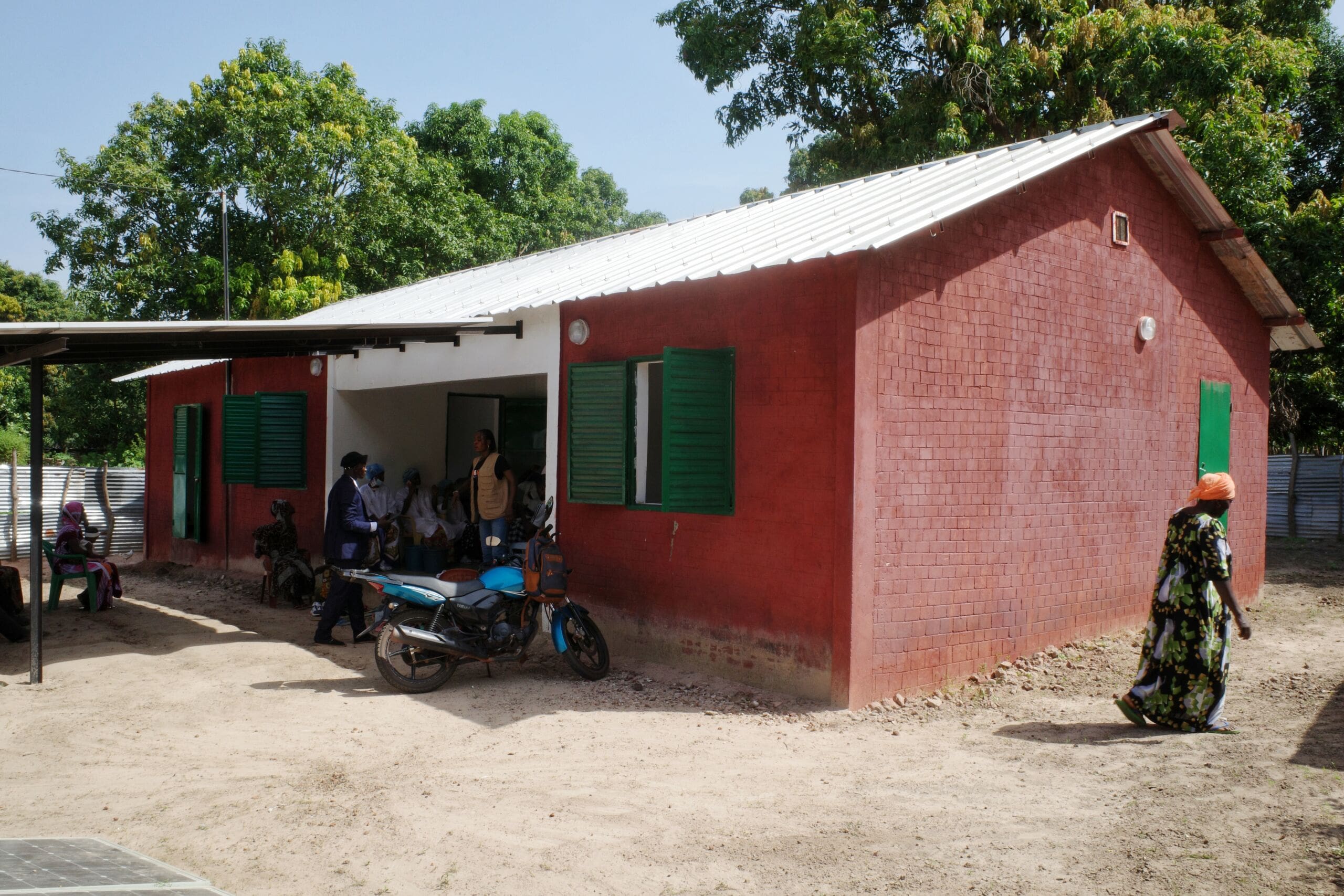
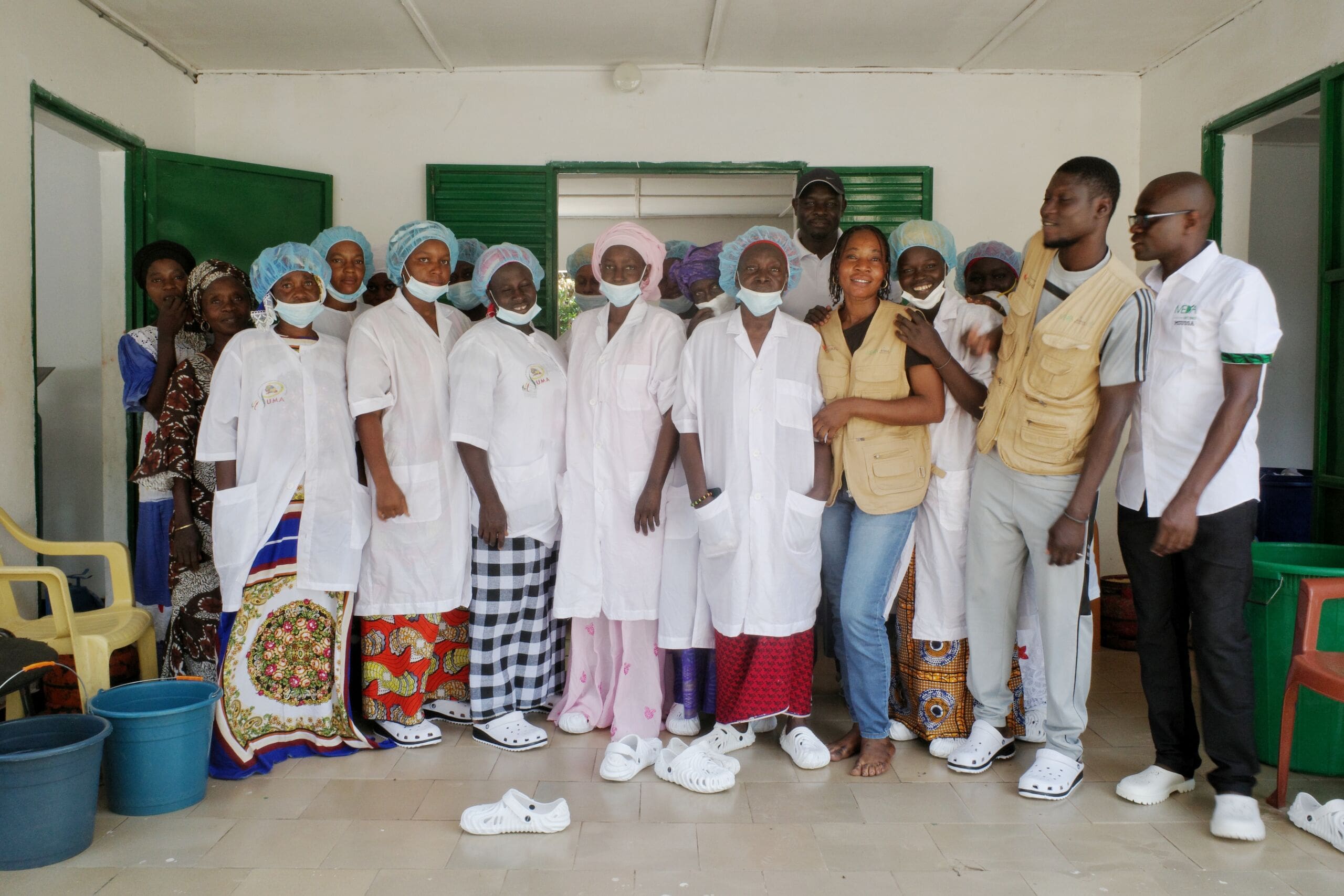
Dia admitted the initiative has yet to take off.
While MEDA rehabilitated the building and purchased the production and storage equipment, the organization does not fund the factory’s daily operations. MEDA is “focused on investments, which are generally more costly,” Dia said.
He justified the approach, arguing that the “project is entrepreneurial, so we won’t give 100 per cent. If we invest, the company has sufficient guarantees to raise working capital and work with a clear business plan.”
The factory members borrowed money from a microfinance bank to raise the working capital.
Dia supported microcredit, saying that “these are long-term institutions that provide village-level credit.”
He added, “we want this proximity [to the bank] to be reinforced” so that when MEDA goes, the factory can continue to benefit from these relationships for sustainability.
The factory members use the borrowed money to buy raw materials and pay for electricity. For their first year, farms donated mangoes free of charge.
However, this will not be the case for the next production cycle, meaning that costs will increase. The cost of electricity is also high.
For the first six months, the factory covered the monthly repayments to the bank. Its members said the next six months should be possible as well. However, they would still have to borrow for the following year. With the increase in costs, the financial burden will be higher.
The members want help with electricity costs, and Dia said MEDA may consider financing solar panels for power generation.
Scaling up
“A single project cannot do everything,” Dia said, especially if it’s a small factory run by a cooperative of village women.
However, he insisted, such projects can create “niches of employment opportunities that generate revenues.”
The “question of employment remains central,” Dia said. For him, adding value to agricultural products provides the opportunity to create jobs.
“Take cashew kernels. We export 95 per cent of them to India and Vietnam, which do the processing,” he said.
“If we can’t process the raw material here, then jobs are also being exported,” Dia added.
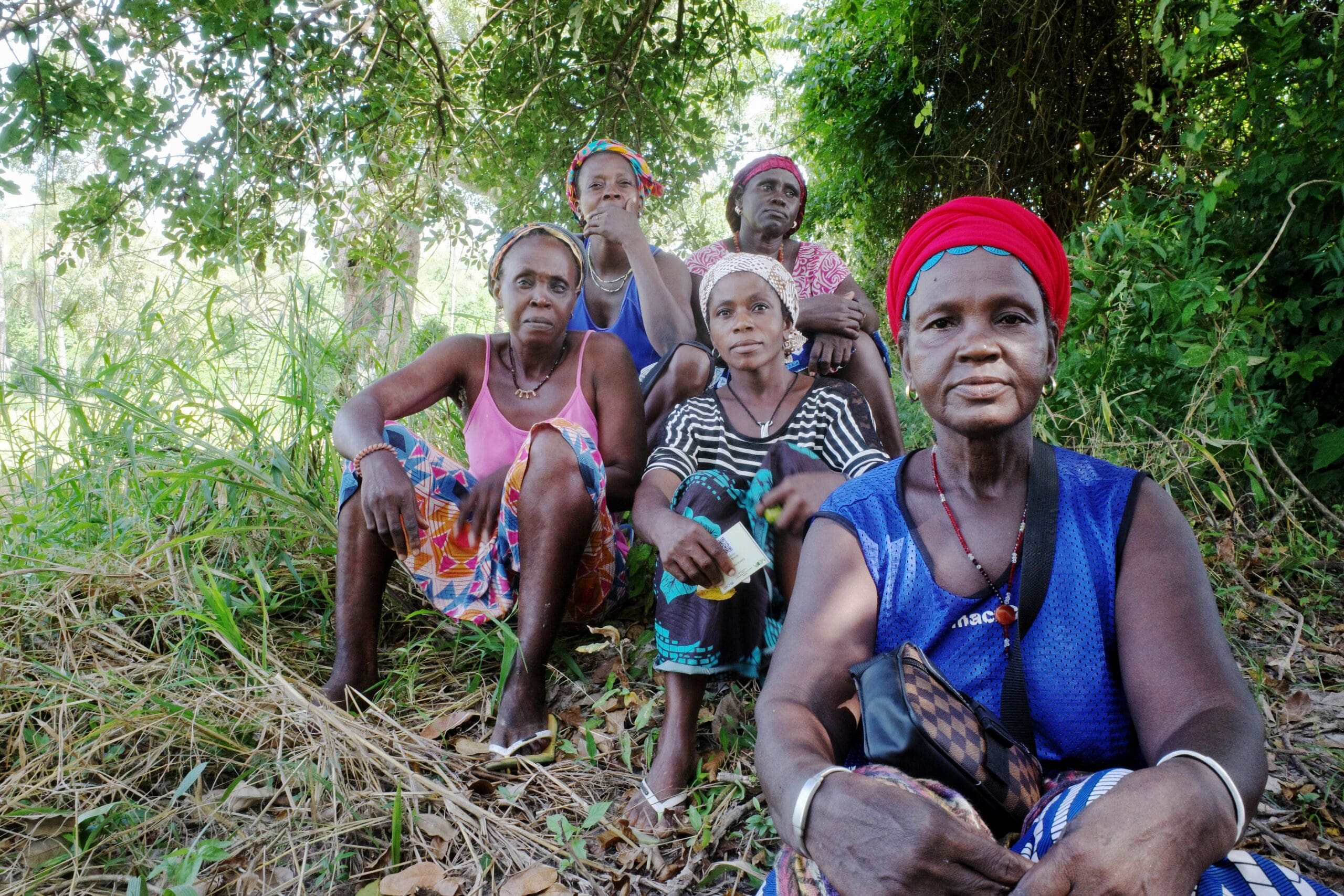
For Dia, startups in the circular economy strengthen Senegal’s economic structure. Eventually, “we need to move towards industrialization, initially on a small and medium scale, before moving on to large-scale facilities,” he said.
Large-scale manufacturing is crucial for growth. “If we look at the juices and syrups that the women process, it’s done on a small scale. So the difficulty is, are we going to be profitable? When are we going to be profitable?” Dia said.
Dia pointed to the government’s and the international development sector’s role in helping the country steer in that direction.
“There’s an enormous amount of effort being made as part of Vision Sénégal 2050. We can sense that the authorities are determined to add value to local products to help keep young people in the area and create niches of opportunity in employment,” he said.
“We also need to open up to international cooperation to reinforce this development of the region’s agricultural potential.”

